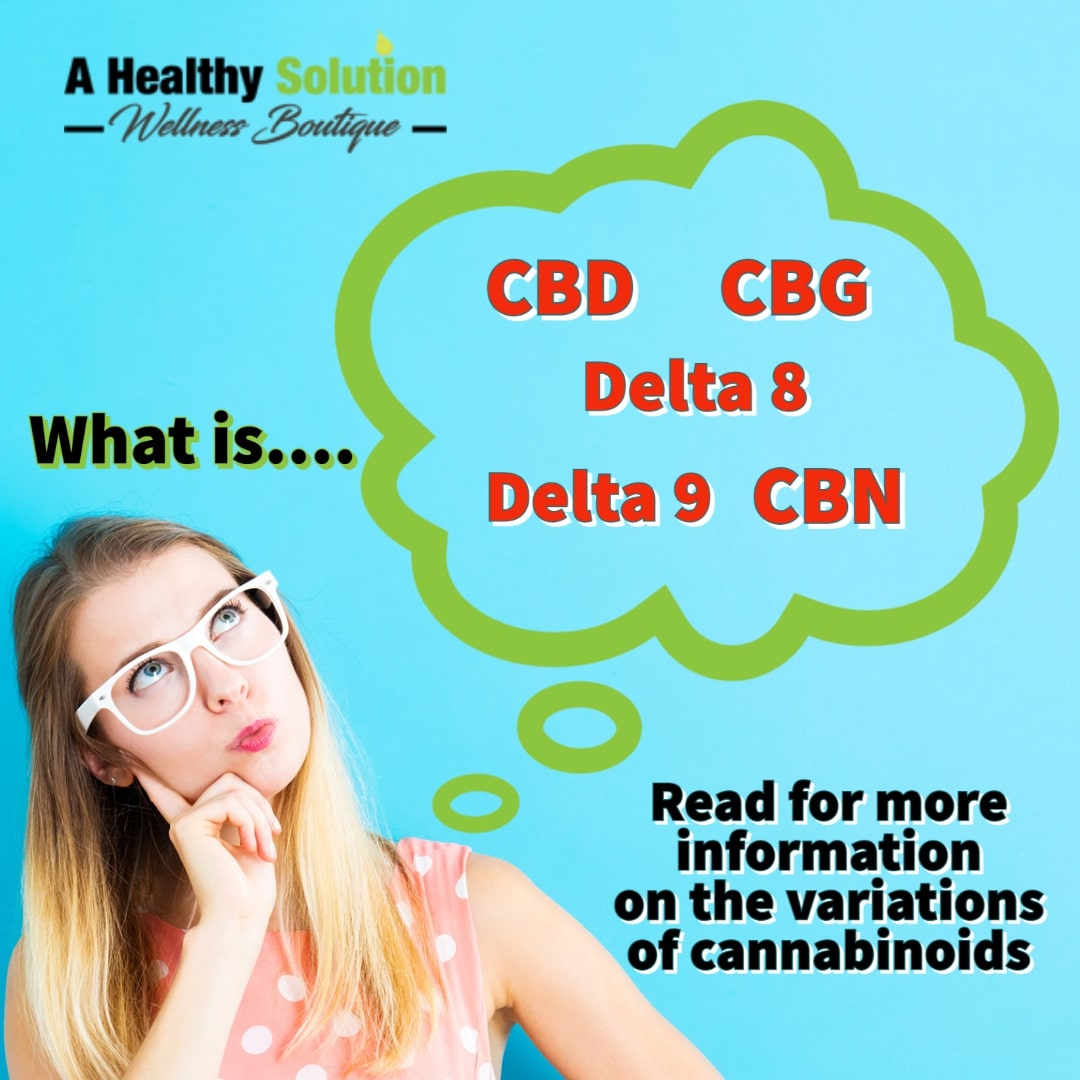There are many different chemical compounds out in the world, each one having a unique effect. In today’s article, we will be discussing different cannabinoids and how they can help you with your everyday care. We will be going over CBD, CBG, CBN, Delta-8, and Delta-9.
CBD: CBD, or Cannabidiol, is one of the many active compounds found in the cannabis plant. Tetrahydrocannabinol, also known as THC, is another active compound and the most well-known, thanks to its psychoactive properties, this compound being the one that gets you “high.” Luckily, CBD is nonpsychoactive and shares many of the medical benefits as THC. This allows you to inherit the benefits without leaving you with the intoxicated feeling that often goes hand in hand with THC. There has also been research that has shown that CBD is a very effective painkiller and has anti-inflammatory properties. This can help make internal and external pain much more manageable. What’s also nice about this compound is that it is not addictive and very safe for you to take. Even if you take too much, at worst you will have a headache, indigestion, or grogginess. When it comes to the medicinal properties of CBD, there are many different ways to take it, including gummies, oil, capsules, and cream. The main uses for CBD would be: pain, inflammation, anxiety, depression, mood balance, seizures, and more!
CBG: Cannabigerol, or CBG, is a non-psychoactive cannabinoid generally abundant in low-THC and high- CBD cannabis strains, including hemp. Like THC, CBG reacts with the cannabinoid receptors in the brain. CBG is the inspiration for other cannabinoids. While CBD has a relatively low affinity for cannabinoid receptors and interacts mostly with the endocannabinoid system on an indirect basis, CBG is thought to interact directly with the brain’s CB1 and CB2 cannabinoid receptors. CBG works to fight inflammation, pain, nausea and works to slow the proliferation of cancer cells. CBG has been called ‘inactive’ when compared to THC, but it has slight similarity for CB1 receptors, roughly equal to that of CBD. Like CBD, it has painkilling and anti-inflammatory properties, indicating that there is scope for developing cannabinoid drugs that do not have the psychoactive properties of THC. The main uses for CBG are usually pain, higher levels of anxiety, depression, mood balance, and more!
CBN: CBN stands for cannabinol. CBN can often be found in aged cannabis, particularly cannabis that has been exposed to a lot of oxygen. Research is still in its preliminary phases; however, studies have found CBN to be highly effective in helping people get better quality sleep. Although it acts a lot like CBD, its origin is different, as it is the product of oxidization. Manufacturers expose THC to heat and light, which
breaks it down, leaving behind CBN. Because of this, no strains of cannabis contain high levels of CBN themselves. CBN comes from the breakdown of the psychoactive cannabinoid THC, while it can be mildly psychoactive itself, it does not produce a high like THC at all. CBN is created when THC-A oxidizes. CBN, though not as widely used for anti-inflammatory purposes as CBD or THC, may have similar abilities
to treat a variety of inflammatory ailments. A 2009 study on cannabinoids as novel anti-inflammatory drugs, for example, identified CBN as a possible treatment for inflammatory disorders such as allergic asthma. Research has also revealed that CBN can treat glaucoma by reducing inflammation that causes intraocular pressure. CBN can be used effectively as a sleep aid or sedative. In addition to its effectiveness as a sleep aid, CBN has recently been identified as a potential painkiller. As previously mentioned, CBN has different mechanisms of action than CBD and THC. Though one of the main uses of CBN would be sleep! This cannabinoid is usually used in products for sleep and are especially powerful when paired with CBD.
Delta-8 & Delta-9: Delta-8 and Delta-9 are fairly new compounds in the CBD world. From a biological standpoint, Delta-8 and Delta-9 differ mostly due to the location of a double bind in their molecular chain. Delta-8 is a minor cannabinoid in hemp and cannabis plants, meaning it is found less abundantly than major cannabinoids like CBD or Delta-9. Though research containing cannabinoids in general is still fairly new but, we do know some major factors that affect how these two variants of THC can impact users. Structure-wise, Delta-8 shares more in common with Delta-9 than it does with CBD. Although CBD is the second most abundant cannabinoid in the cannabis plant, it doesn’t have the same effect on the brain’s CB1 and CB2 as its THC equivalents. Delta-8 is a significant cannabinoid, mainly thanks to its ability to serve as a more relaxed and efficient alternative for Delta-9. Though it is a major cannabinoid that can be found in abundance in cannabis, extraction is usually fairly cheap and simple as a result. It tends to be derived from marijuana plants specifically. While there is no denying that Delta-9 is a potent compound, being about twice as strong, not to mention an effective and natural healer for those suffering from a multitude of conditions and medical issues, it also brings with it quite a few undesirable side effects. Paranoia and anxiety often top the list of unfavorable side effects linked with traditional marijuana, along with sleep issues and addiction with longer-term use. Delta-8 doesn’t appear to have many of these harmful effects, at least not nearly to the same extent as Delta-9. This makes it a top choice for those seeking similar relaxational properties and euphoric effects to Delta-9, but with far less of the unpleasant mental side effects. Delta- 8 may very well help with sleep in some users. A consistent, regular routine with the right amount will play a major factor.
Depending on your condition, our employees at AHS can help you find what you need. We also have free consultations with the owner and nurse if you have any questions on medications, your current condition, and more!



Leave A Comment
You must be logged in to post a comment.